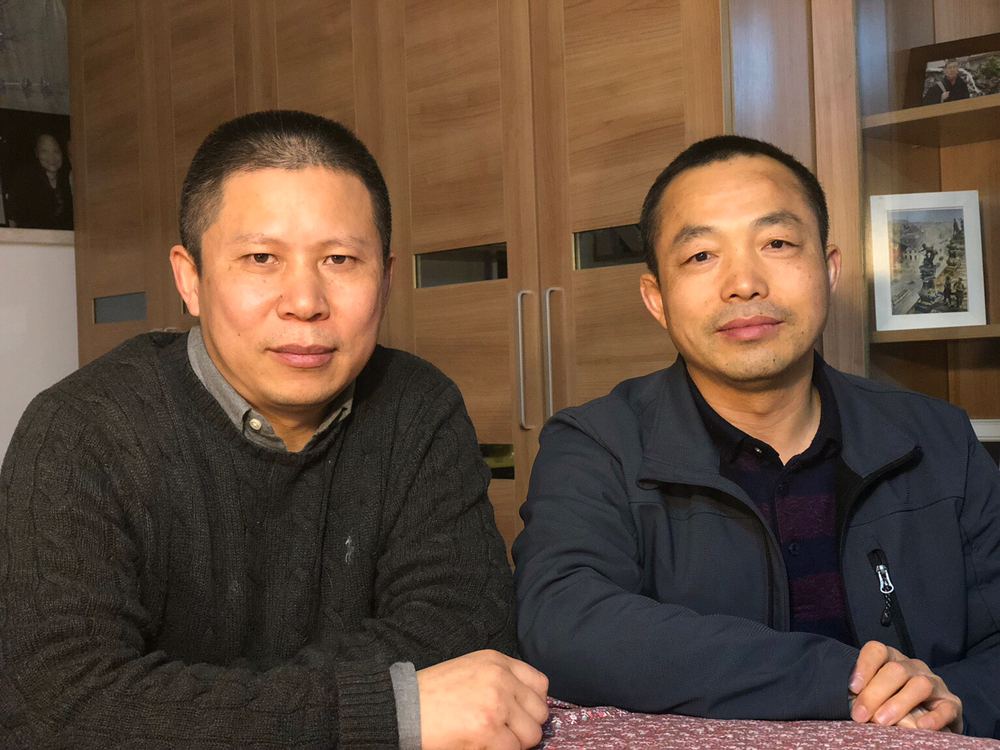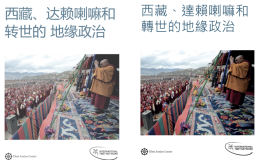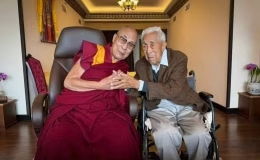Joint Statement on the Fifth Anniversary of the ‘Xiamen Gathering’ Crackdown
Standing in solidarity with Human Rights Defenders in China
International Tibet Network joins global civil society organisations to call for the release of Xu Zhiyong, a Chinese rights advocate and scholar who has worked tirelessly to change China’s legal system and has been outspoken in support of the Tibetan people.
Xu Zhiyong was among dozens of lawyers and activists who attended an informal gathering held in Xiamen, a city on China’s southeast coast, in December 2019, where they discussed the situation of civil society and current affairs in China. On 15 February 2020, Xu was detained and sentenced to 14 years in April 2023.
Xu’s commitment to the Tibetan cause is evident in his powerful Opinion piece, “Tibet Is Burning,” published in the New York Times in 2012. [1] which described his attempts to visit the family of a Tibetan self-immolation protestor named Nangdrol, in order to pay his respects. The piece concluded, “I am sorry we Han Chinese have been silent as Nangdrol and his fellow Tibetans are dying for freedom. We are victims ourselves, living in estrangement, infighting, hatred and destruction. We share this land. It’s our shared home, our shared responsibility, our shared dream — and it will be our shared deliverance.”
Xu Zhiyong was also a founder of the Beijing-based think tank, “Gongmeng” or Open Constitution Initiative, which conducted an independent investigation into the 2008 Uprisings on the Tibetan plateau. The resulting report [2] challenged the Chinese Government’s position that the Dalai Lama incited the protests and presented evidence that the protests resulted from failures in Chinese policy.
Read the full joint statement calling for his and others, immediate and unconditional release below.
_____
10 February 2025
26 December 2024 marked the fifth anniversary of the crackdown on the “Xiamen gathering”, a private gathering that about 20 Chinese human rights defenders and lawyers convened in Xiamen, China in December 2019 to discuss the situation of human rights and civil society in China. In the weeks after, Chinese authorities interrogated, harassed, detained and imprisoned every participant who was not able to leave China then and subjected almost all of them, including some families and friends, to travel bans, up to the present day, under the pretext of national security.
Among those detained were legal scholar Xu Zhiyong and human rights lawyer Ding Jiaxi. Both are leading human rights defenders who spearheaded the “New Citizens’ Movement”, empowering citizens as rights-bearers to advocate for a more equal, rights-respecting and free society, and to combat corruption, wealth inequality and discrimination in access to education. In 2014, Xu and Ding were both sentenced to four years and three and a half years in prison, respectively, for participating in the New Citizens’ Movement and charged with “gathering a crowd to disturb public order”.
From 26 December 2019, and over the weeks that followed, the Chinese authorities forcibly disappeared both under Residential Surveillance at a Designated Location (RSDL), a criminal procedure allowing secret detention for up to six months without access to legal counsel or family. RSDL is considered by UN Special Procedures experts to constitute secret detention and a form of enforced disappearance, and may amount to torture or other ill-treatment. While held under RSDL, both men were subjected to torture and other ill-treatment, before being charged with the national security crime of “subversion of State power”. They were subsequently convicted in a secret trial and handed severe prison sentences of 14 and 12 years, respectively, in April 2023. Despite multiple calls from the UN High Commissioner for Human Rights Volker Türk and from UN Special Procedures’ experts as recently as November 2024, China has failed to address these grave violations.
These cases are emblematic of a broader and alarming trend of persecution of human rights defenders and lawyers in China. Authorities systematically employ RSDL, harsh national security charges, torture and other ill-treatment, prolonged detention, travel bans and harassment to silence dissent and dismantle independent civil society. The use of vague charges such as “subversion of State power” or “picking quarrels and provoking trouble” has become a routine tactic to criminalise human rights work, despite UN human rights experts’ repeated call for them to be repealed. Victims often face prolonged pre-trial detention, lack of due process, restricted access to lawyer and adequate healthcare, and torture or other ill-treatment aimed at extracting forced ‘confessions’.
This systematic repression is further reflected in the cases of human rights lawyers Xie Yang and Lu Siwei, feminist activist Huang Xueqin, labour activist Wang Jianbing, and citizen journalist Zhang Zhan, all of whom are currently subjected to arbitrary detention or imprisonment . UN Special Procedures’ experts have recently described these cases as part of “recurring patterns of repression, including incommunicado detention and enforced disappearance aimed at […] silencing human rights defenders and dissenting or opposing views critical of the Government”.
As we commemorate the fifth anniversary of the crackdown, we, organisations and activists from all over the world, continue to stand in solidarity with all human rights defenders and lawyers in China who courageously advocate for justice despite knowing the risks of doing so.
We urge the Chinese government to:
- Immediately and unconditionally release all human rights defenders and lawyers arbitrarily detained or imprisoned for their human rights work, including Xu Zhiyong and Ding Jiaxi;
- End the systematic crackdown on civil society, including harassment, unjustified detention, enforced disappearance, and imprisonment of human rights defenders and lawyers;
- Amend laws and regulations, including national security legislation, the Criminal Law and the Criminal Procedure Law, to bring them fully in line with international human rights standards;
- Rescind the travel bans imposed on the gathering participants as well as their friends and families immediately
Signatories:
| Alliance for Citizens Rights Amnesty International Asian Lawyers Network (ALN) (Japan) CIVICUS: World Alliance for Citizen Participation Free Tibet (United Kingdom) Human Rights in China Humanitarian China India Tibet Friendship Society Nagpur Maharashtra (India) International Bar Association’s Human Rights Institute (IBAHRI) International Campaign for Tibet International Federation for Human Rights (FIDH), within the framework of the Observatory for the Protection of Human Rights Defenders International Service for Human Rights (ISHR) International Tibet Network Judicial Reform Foundation (Taiwan) Lawyers for Lawyers (Netherlands) LUNGTA – Active for Tibet (Belgium) PEN America (United States) Safeguard Defenders (Spain) Swiss Tibetan Friendship Association (Switzerland) Taiwan Association for Human Rights (Taiwan) The 29 Principles (United Kingdom) |
The Network of Chinese Human Rights DefendersThe Rights Practice (United Kingdom) Tibet Justice Center (United States) Tibet Solidarity (United Kingdom) Voluntary Tibet Advocacy Group (V-TAG) (Netherlands) World Organisation Against Torture (OMCT), within the framework of the Observatory for the Protection of Human Rights Defenders Acción Solidaria (Venezuela) Amnistía Internacional Chile (Chile) CADAL (Argentina) Centro de Derechos Humanos Fray Francisco de Vitoria OP, A.C. (Mexico) CONTIOCAP – Coordinadora Nacional de Defensa de Territorios Indígenas Originarios Campesinos y Áreas Protegidas en Bolivia (Bolivia) Movimiento Autónomo de Mujeres (Nicaragua) Red Nacional de Organismos Civiles de Derechos Humanos Todos los Derechos para todas, todos y todes (Mexico) Voces de Tíbet (Mexico) Individual signatories: |
NOTES:
1) “Tibet Is Burning” http://www.nytimes.com/2012/12/13/opinion/tibet-is-burning.html
2) The Gongmeng report was translated in full by International Campaign for Tibet, May 2009 http://www.savetibet.org/bold-report-by-beijing-scholars-reveals-breakdown-of-chinas-tibet-policy/






Leave a Comment